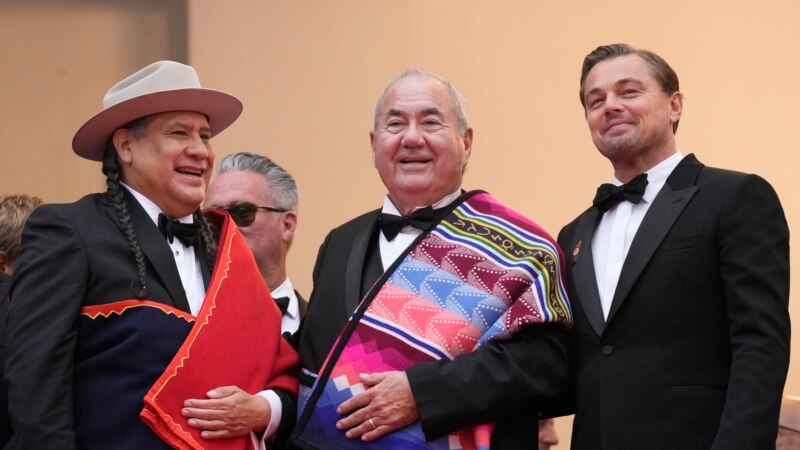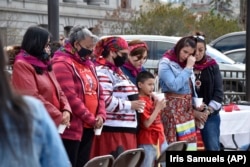This website uses cookies so that we can provide you with the best user experience possible. Cookie information is stored in your browser and performs functions such as recognising you when you return to our website and helping our team to understand which sections of the website you find most interesting and useful.

Here are some of Native American-related news stories that made headlines this week:
Oklahoma’s Cherokee governor vetoes Native regalia bill
Oklahoma Governor Kevin Stitt this week vetoed a bill that would have allowed Native American students to wear tribal regalia during graduation ceremonies.
Senate Bill 429, which passed both the Oklahoma House and Senate, defined regalia as clothing, jewelry, feathers, stoles and “similar objects of cultural and religious significance.”
Stitt, a citizen of the Cherokee Nation whose ancestry has been previously challenged, vetoed the bill on Monday, saying schools had the right to determine their own dress codes.
“In other words, if schools want to allow their students to wear tribal regalia at graduation, good on them; but if schools prefer for their students to wear only traditional cap and gown, the Legislature shouldn’t stand in their way,” he said in his veto message.
Native American Rights Fund Deputy Director Matthew Campbell said that wearing feathers and regalia is “already a protected religious freedom for Native students.”
He added, “Unfortunately, Governor Stitt’s veto sends a message to Native students that in Oklahoma, Native students must choose between their culture and religious freedoms and celebrating their achievements.”
Cherokee Principal Chief Chuck Hoskins joined Choctaw Nation Chief Gary Batton in urging lawmakers to “quickly override” the veto.
Violence Against Women Reauthorization Act
The Violence Against Women Reauthorization Act of 2013 included a provision allowing “special domestic violence criminal jurisdiction” (SDVCJ) over non-Indian offenders committing domestic violence or dating violence on tribal land. Prior to this, tribes did not have jurisdiction over non-Native offenders on tribal lands.
Currently, more than 30 tribes exercise SDVCJ, and under the 2022 reauthorization of the act, can now be reimbursed for the costs involved in prosecuting these cases.
That reauthorization, also known as VAWA 2022, expanded the types of cases these tribes may prosecute to include sexual violence, sex trafficking, stalking, child violence, assault of tribal justice personnel and obstruction of justice.
“Tribes know best what their communities need, so I encourage tribal leaders, community members, and survivors to review this regulation for the Tribal Jurisdiction Reimbursement Program. It is critical that programs serving tribal communities are informed by tribal voices,” said Allison Randall, acting director of the Justice Department’s Office of Violence Against Women
“We are dedicated to removing barriers to access, and it is a victory that VAWA 2022 allows us to continue the Tribal Jurisdiction Program, as well as reimburse expenses incurred as a result of implementation.”
The interim final rule on reimbursements was published April 11. The public has until June 12 to comment.
Read more:
Navajo Nation rejects Biden proposed ban on mineral leasing near Chaco
The Navajo Nation this week approved a resolution opposing the Biden administration’s proposed ban on oil and gas drilling on federal lands in and around New Mexico’s Chaco Canyon.
U.S. Interior Department Secretary Deb Haaland announced in November 2022 a 20-year moratorium on mineral leasing within a 16-kilometer buffer zone around the site.
“Chaco Canyon is a sacred place that holds deep meaning for the Indigenous peoples whose ancestors lived, worked and thrived in that high desert community,” Haaland said at the time. “Now is the time to consider more enduring protections … so that we can pass on this rich cultural legacy to future generations.”
Navajo leadership opposes the plan, cautioning President Biden that it could have a “devastating impact” on thousands of Navajo land allottees who depend on oil and gas royalties for their livelihoods. At the time, the Nation suggested reducing the buffer zone around the canyon to 8 kilometers. The resolution signed this week opposes any buffer zone whatsoever.
Quannah Chasinghorse at 2023 Met Gala
Han Gwich’in and Oglala Lakota activist and model Quannah Chasinghorse was among the celebrities wearing pink at this year’s Metropolitan Museum of Art gala on Monday, which honored controversial fashion designer Karl Lagerfeld who died in 2019. Many media outlets were quick to interpret this as a subtle jab at the designer, who notoriously hated pink.
“Think pink,” he is quoted as saying, “but never wear it.”
Lagerfeld was famous for his scathing remarks against overweight people, “ugly people,” the #MeToo movement and Syrian immigrants. He appropriated Native American imagery and stereotypes in a 2013 fashion show.
Whether Chasinghorse wore pink to mock the designer is unclear, especially considering remarks she made ahead of the event.
"I feel that Karl Lagerfeld was really good at bringing people in and showing the beauty within them," she told Bazaar magazine. "I think it is beautiful to see that throughout his legacy, he has been able to uplift people and where they come from."
Native American photographer tells Indigenous tribes' stories
Ten years ago, Native American photographer and documentarian Matika Wilbur, a member of the Swinomish and Tulalip tribes in the State of Washington, set off to photograph what were at the time 562 federally recognized Indigenous tribes in the U.S. VOA reporter Natasha Mozgovaya caught up with Wilbur in Seattle to discuss her new book, "Project 562: Changing the Way We See Native America."



 Africana55 Radio
Africana55 Radio 




